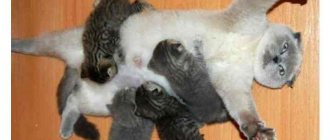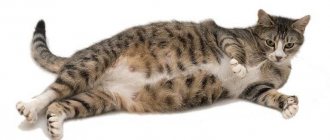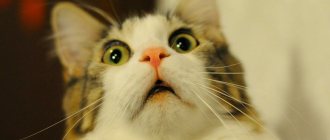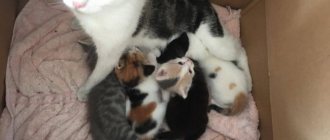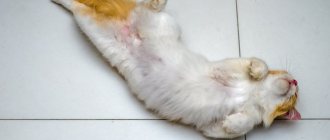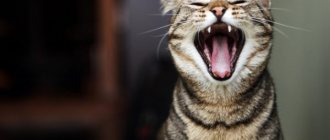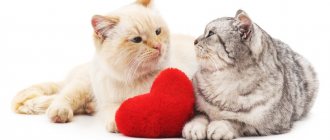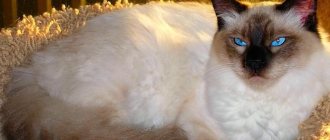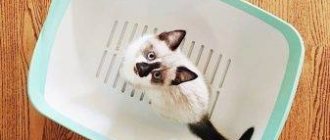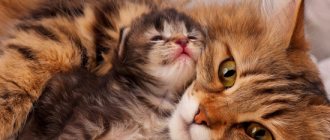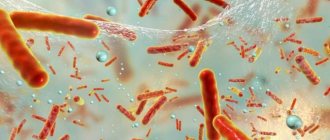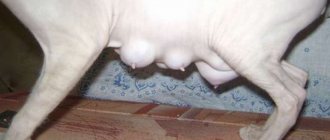The birth of kittens is an important and responsible process, during which the mother’s body is subjected to serious overload. And if something goes wrong, your pet will probably feel very unwell. In particular, some cat births end with the animal losing its appetite completely or partially. Often this indicates severe pathological processes occurring in the body. If you do not immediately contact a veterinarian, the matter can end quite sadly.
Natural causes of tachypnea
Almost all physiological and non-hazardous causes can be determined by any owner on their own.
These include changes in ambient air temperature (when a cat overheats, the cat’s breathing quickens, so the body cools itself), pregnancy, increased physical activity, and others.
Sometimes attentive owners notice excessively rapid breathing in a cat during sleep, however, this condition, in the absence of other symptoms, is a physiological norm. Cats also have different stages of sleep and they also dream, so their breathing rate may change during sleep.
In such cases, rapid breathing does not pose any danger to the health or life of the pet and is nothing to worry about.
Possible problems after giving birth to a cat
1. The cat has greenish or reddish discharge for 2-3 weeks after birth Greenish and reddish discharge in a cat after birth is normal, unless accompanied by fever, vomiting and diarrhea. Otherwise, you should consult a doctor.
2. The cat breathes frequently after birth If the cat breathes frequently immediately immediately after birth, and this condition lasts no more than 5-10 minutes, then everything is in order. Otherwise, you should consult a doctor.
3. The cat has diarrhea and/or vomiting after giving birth. Diarrhea and vomiting after giving birth in a cat is a sign that the cat has eaten too much afterbirth. Everything should go away within 24-48 hours. Otherwise, you should consult a doctor.
4. The cat is constipated after giving birth
If a cat has constipation after giving birth, then, as always, in such cases, it is necessary to give the pet Vaseline or olive oil. If stool does not appear within 24 hours, you should consult a doctor.
5. Lactation disorders in cats Anxiety in kittens indicates a lack of milk. It is worth noting that milk flows to the nipples during feeding and is not present in them constantly, and the peak of milk production occurs on days 7-9, so it is almost impossible to check the presence of milk in a cat by pressing on the nipples. Examine her nipples; if any nipple is retracted, then it should be massaged and the most active kitten should be applied to it.
Lactation in cats is caused by the sucking of kittens; experienced cats themselves push the kittens towards themselves; to inexperienced cats, the owner must attach the cubs. If one of the nipples is retracted, then you need to massage it, and then attach the most active kitten to it.
6. The cat’s milk is too thick or yellowish or smells bad. Most likely, the milk is infected, the kittens should be urgently switched to artificial feeding, and the cat should be taken to the veterinarian.
7. The cat refuses kittens
If a cat refuses kittens, it is necessary to check the presence of milk, determine whether the cat has complications after birth, examine the kittens for any abnormalities, and provide peace and quiet for the cat and kittens. If you notice any complications in your cat after giving birth, consult your doctor immediately.
Pathological causes of rapid breathing
There are quite a lot of pathological causes, the influence of which can provoke the development of the problem, so they are divided into three main types: pathologies of the upper respiratory tract, pathologies of the lower respiratory tract and pathologies not related to the respiratory system.
Upper respiratory tract problems:
- Damage to the sky.
- Tracheal diseases (collapse, neoplasms)
- Diseases and pathologies of the sinuses and nostrils. Infectious lesions, inflammatory processes, neoplasms, congenital pathologies.
Lower respiratory tract problems:
- bronchial diseases (parasites, bronchial asthma, neoplasms, bronchitis);
- diaphragmatic hernia;
- lymph nodes and neoplasms in the chest area;
- hydrothorax and pneumothorax (accumulation of air or fluid in the pleural cavity);
- lung diseases (parasites, pulmonary embolism, pneumonia, neoplasms and bleeding).
Pathologies of third-party organs and systems not related to the respiratory system:
- Obesity. Just like in humans, excess body weight in cats affects the functioning of the animal’s entire body, including the respiratory system.
- Pathologies and diseases of the abdominal organs (ascites, neoplasms, organ enlargement).
- Blood diseases (anemia).
- Heart pathologies (arrhythmia, failure).
- Diseases of a neuromuscular nature (inflammation, traumatic lesions, neoplasms).
- Endocrine diseases (diabetes mellitus).
Against the background of any of the above diseases and conditions, rapid breathing may develop. It is necessary to understand that tachypnea is not an independent pathology, but only a symptom of a certain disease.
The occurrence of rapid breathing in a cat after vaccination may indicate the development of an allergic reaction in the pet.
In such cases, the animal must be continuously monitored for several hours; if the condition worsens, the cat must be urgently taken to the veterinarian.
The course of some allergic reactions can take a life-threatening form, so trying to cope with the problem on your own is prohibited.
If you notice rapid breathing in a cat after giving birth, it is recommended to immediately seek help from a veterinarian. Physiological tachypnea in cats after birth can last no more than 15-30 minutes.
If rapid inhalations and exhalations bother your cat after this time, then you should not hesitate to go to the doctor. In such cases, tachypnea can be a symptom of serious pathologies (eclampsia, retained placenta, mastitis and others).
Condition of the kittens
Why is a cat restless and meowing after giving birth? It is possible that the reason for her behavior is kittens. After all, the cubs do not always emerge healthy. They often have problems. For various reasons, they may be undeveloped and weak. Let's look at the main ones:
- congenital anomalies.
- hypoxia;
- intrauterine infections;
- hypothermia;
- anatomical deviations;
- dehydration (due to lack of milk);
- hypoglycemia;
- cat obesity.
Therapeutic measures
Treatment in each case is determined by the veterinarian on an individual basis, since in order to eliminate pathologically rapid breathing in a pet, it is necessary first of all to identify and cure the underlying disease.
There is no specific treatment for rapid breathing, just as there are no such drugs.
Therefore, the veterinarian’s task in such cases always comes down to eliminating the root cause of the pathology. After which the animal’s breathing returns to normal over time.
In most cases, cat birth occurs without any complications. But it also happens that during the birth process, unforeseen circumstances arise that threaten serious complications, both for the animal and for the future kittens. Unlike other pets - dogs, cats do not use their tongue to increase the area of evaporation and regulate body temperature. If a cat frequently breathes with its mouth open after the end of the birth process, this may indicate serious problems with the health of the animal and requires immediate attention to a veterinarian.
Cat comfort after birth
Place
Think in advance about a place where your cat will feel safe. It should be secluded, away from noise and drafts.
Build a bedding. It should be light and clean. For convenience, place disposable diapers on top.
Temperature
The room temperature should be comfortable. If the room is cool, place an electric or water heating pad in the socket.
Breeders often use an infrared lamp to create a comfortable temperature.
Food and toilet
Everything that a young mother may need in the near future is placed in close proximity to the nest.
This is necessary so that the cat is not separated from her offspring for a long time.
On a note!
During the first time after giving birth, experts recommend feeding your cat special food for nursing cats.
Sometimes cats refuse food for the first days after giving birth. The owner must ensure that this does not happen: the mother must eat well in order to provide the offspring with milk and quickly recover herself.
If you see that your cat refuses food, try experimenting with the form of serving: mousse, jelly, boiled meat, etc.
Causes of rapid breathing after childbirth
Childbirth is a rather difficult and dangerous period of life for a cat, because the birth canal can become infected with various pathogenic microorganisms or be injured. After the end of normal labor, the cat breathes rapidly for 5-15 minutes. If rapid breathing continues for much longer, you should consult a doctor as soon as possible. Due to the fact that the animal may experience complications. The animal may breathe frequently after birth due to severe stress.
Other dangerous complications with increased body temperature are:
- retained placenta;
- unborn dead fetus inside the uterus;
- inflammation of the mammary glands;
- eclampsia.
Characteristic changes during the rehabilitation period of a cat after childbirth depend directly on how the birth process went. An important recommendation is to contact a veterinarian immediately after the cat has given birth to kittens. This is necessary to monitor the condition of the animal and exclude possible pathological conditions.
Note! In the first week after birth, it is necessary to monitor the cat’s body temperature. Measurements are taken once a day. A rise in temperature above 39.5 degrees is a reason to contact a veterinarian.
The first sign of this pathological condition is an increase in temperature, restless behavior of the cat and dragging of kittens. The animal often breathes with its mouth open and refuses to eat. It is important to monitor during the birth process, and it is best to record how many kittens were born and the number of afterbirths released. An alarming sign if one of the placentas does not come out.
Important! It is worth remembering that an ultrasound examination does not always give a positive result. The fact is that the uterus is enlarged after childbirth and may contain blood clots, which are mistaken for a failed placenta.
When diagnosing retained placenta, conservative treatment is carried out, including the use of medications. After treatment, the placenta comes out in the form of lochia over several days. In certain cases, surgery is used.
Possible reasons
It happens that after giving birth a cat becomes restless, meows, looks into the eyes, and fusses. Her unusual behavior is associated with:
- her or her cubs' physical condition;
- psychological reasons (depression or stress).
When the birth takes place without complications, the cat’s health is normal, then she calmly lies down with the kittens, providing the latter with access to the nipples. She may refuse food and water for some time. This is a normal condition, the cat is just afraid to leave helpless kittens.
General information
Pregnancy leads to many anatomical and physiological changes in a cat's body. Many of these changes directly or indirectly affect the state of the cardiovascular system, which is not surprising: during pregnancy, it must work twice as intense. It is for this reason that any problems in the functioning of the heart and/or blood vessels, which the body could somehow compensate for in normal times, become pronounced.
The cat went on a hunger strike - what happened to her after giving birth?
A common cause of this occurrence is associated with minor inflammations in the parental tract and uterus. This happens due to difficult childbirth, ruptures and other wounds appear on the mucous membranes of the genital organs. The cat is in pain and cannot eat due to stress. The most dangerous thing is if the cat has inflammation of the uterus or so-called endometritis. With this inflammation, fever appears, which significantly affects the condition of the pet. With moderate inflammation, the cat may recover in a few days.
Some cats exhibit nervous behavior after giving birth and eat in spurts because they are constantly worried about their kittens. In this case, the situation cannot be aggravated - it is necessary to temporarily isolate all pets from the cat and its offspring, and also not invite strangers to “look at the kittens.” At first, only the person the cat trusts can be near the cat.
why and why cats eat grass
